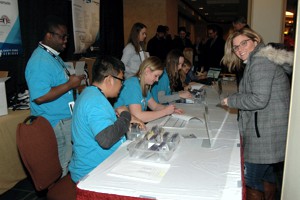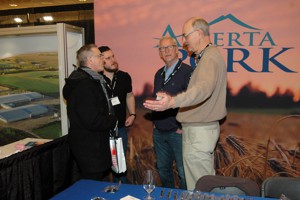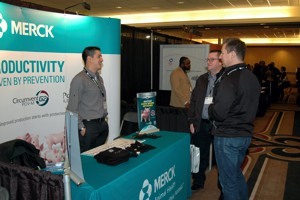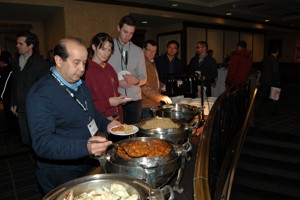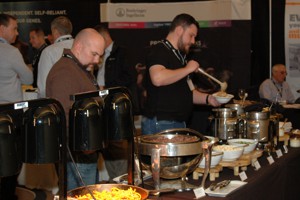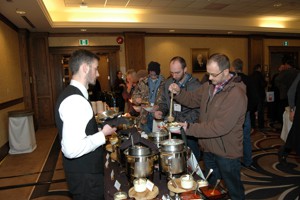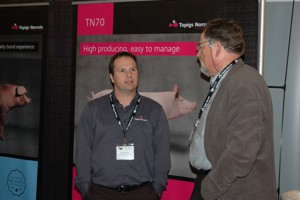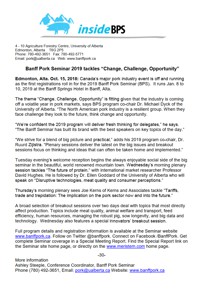Inside BPS Blog
News from the Meristem editors from inside the 2019 Banff Pork Seminar.
- That's a wrap: Mark your calendar for BPS 2020
- Tell your network what happened at Banff Pork Seminar 2019
- Rising tide of protein demand good news for the pork industry
- Livestock Transport critically important
- African Swine Fever spreading around the world
- 2019 BPS student science winners announced
- Tom Stein, Maximus Systems: 2019 Foxcroft Honorary Lectureship
- Follow the fat to improve meat quality
- Consumers demand more from meat
- BPS 2019 Aherne Prize winners tell the story behind their inventions
- Smart technologies here or emerging in pork production
- The new brain in the barn
- Get more value from consultants
- Niels-Peder Nielsen: Denmark raises the bar on animal care standards
- Ellen Goddard: More disruptive technologies coming in pork production
- Change. Challenge. Opportunity: Embrace the potential at BPS 2019
- Networking begins at BPS 2019
- Good energy in the room as BPS 2019 launches a busy week
- Walk-in registrations welcome at BPS 2019
- The annual last minute tips for BPS delegates
- Drive the modern pork story from BPS with #banffpork
- Download the BPS 2019 App
- Trade, African Swine Fever highlight Thursday morning at 2019 Banff Pork Seminar
- Still time to register for Banff Pork Seminar 2019
- Alberta Pork returns as Sustaining Sponsor for BPS 2019
- PIC welcomes friends and partners to BPS 2019!
- Amy Cronin: New chair has a global vision for BPS
- Young scientists and innovators highlight BPS Breakout Session 8
- "Beyond the horizon" plenary wraps up BPS 2019
- Media welcome at Banff Pork Seminar 2019
- The secrets to sow longevity
- Two routes to better feed efficiency
- The search for true meat quality
- Harvesting the promise of big data and new technology
- Hear the latest on animal welfare in transport at BPS 2019
- Finding the road to the robust pig
- Harnessing the power of people
- BPS 2019 registrations and hotel rooms moving briskly
- Don't miss day 1 BPS: The future of protein, disruptive technologies
- Free pre-BPS presentation on two critical topics
- The people who directed Banff Pork Seminar 2019
- 2019 Banff Pork Seminar sponsor support keeps delegate costs down
- News Release: Banff Pork Seminar 2019 tackles "Change, Challenge, Opportunity"
- Student science abstract deadlines Oct. 31, 2018
- 2019 Banff Pork Seminar Aherne Prize entry deadline is Oct. 31, 2018
- Welcome to Banff Pork Seminar 2019
That's a wrap: Mark your calendar for BPS 2020
Date posted: January 11, 2019
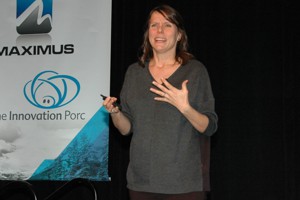
Mylène Paquette
When BPS chair Amy Cronin opened the 2019 Banff Pork Seminar (BPS) she told the nearly 750 delegates in attendance that they should challenge themselves on how they would get the most personally and for their operation out of every speaker they heard over the program.
Cronin closed the program Thursday afternoon by introducing Mylène Paquette, an admirable woman who had set a challenge for herself that most people would never imagine taking on themselves.
Paquette completed a solo rowing crossing of the North Atlantic Ocean. She spent five years of preparation and completed the epic journey in 129 days. She described in detail the planning and actual journey, how many times she wondered whether she would succeed and how she eventually did. The number one thing she learned, she told her audience: "The only thing we control is our attitude."
Dr. Ruurd Zijlstra, co-program chair for the 2019 Banff Pork Seminar reminded delegates the success of the Seminar depends on them to keep the program fresh. He asked everyone to fill out their survey forms emailed to them, and challenged them to send two new ideas for next year.

Dr. Ruurd Zijlstra
Zijlstra also encouraged anyone interested in serving on the BPS Advisory Committee to send their names to the BPS office. He thanked those committee members who have served. He thanked all sponsors for their strong support again this year and reminded delegates that sponsor support means a savings of $220 a person in registration costs this year.
"Finally, mark your calendars for Banff Pork Seminar 2020," he says. "Dates are Jan. 7 to 9, 2020."
Tell your network what happened at Banff Pork Seminar 2019
Date posted: January 11, 2019

Here's an easy way to tell your network the highlights of what happened at the 2019 Banff Pork Seminar Jan. 8 to 10, in Banff, Alta. It was powerful event with nearly 750 delegates attending.
News articles and much more from the Seminar are highlighted in this Special Inside BPS Report and are available for use by media and industry information channels.
A short list of headline examples from news features and blog items available in this web-based report includes:
- Banff Pork Seminar tackles "Change, Challenge, Opportunity"
- Get ready for more disruptive technologies in pork production
- Denmark raises the bar on animal care standards
- Four ways to get more value from consultants
- Smart technologies: The new brain in the barn
- Nine emerging technologies here or coming
- Aherne Innovation Prize at 2019 Banff Pork Seminar shared by two winners
- The stories behind the BPS Aherne Prize winners
- David Hughes: Consumers demand more from meat
- Brian Sullivan: Follow the fat to improve meat quality
- Humans spreading African Swine Fever around the world

In addition there are about 40 blog items and selected speaker photos available for download. The Banff Pork Seminar 2019 Special Report is available via link on the Banff Pork Seminar website at the Special Report link at www.banffpork.ca or directly at www.meristem.com.
Rising tide of protein demand good news for the pork industry
Date posted: January 11, 2019

Joseph Kerns
The "Trade, Tariffs and Trepidation" session by Joseph Kerns of Kerns & Associates at the 2019 Banff Pork Seminar was a fast-paced run through soybean and corn production, foreign market imports and exports, and the implication of these to the pork sector.
Kerns outlined the winners and losers in some critical areas:
- Recent ratification of international trade agreements such as CPTPP and CETA: Canada is a partner in these agreements and a winner in this category as the United States is currently without these agreements and is in the midst of a government shutdown.
- Win: Consumers are seeing price benefits when purchasing protein due to a strong supply, especially for chicken. Lose: But China is struggling with a fading GDP, a stock market under considerable duress, auto sales are down and the country is feeling the impact.
- Win: Producers who are winning right now are strong balance sheet managers, and there is some significant restructuring in the industry. Lose: But Kerns said "We are refinancing some entities right now. There is a huge chasm of winners and losers inside our industry, and this includes leveraged land-based operations."
Kerns highlighted what appears to be a continuing upward trend of global GDP numbers well into 2030. He brought those numbers together and forecasts that $38 trillion more in GDP could translate into an increase of a 140 million metric tonnes in meat and poultry consumption between 2017 and 2030, which is an increase of 46 per cent.
This is an unprecedented increase over a relatively short amount of time and as Kerns explained, "This is a rising tide that will float all ships. The sandbox (meat demand) is getting bigger and pork is the dominant protein in the world."
Much of that demand for protein is being driven by emerging economies in the Middle East and Asia but there continues to be small increases in Western economies such as the United States and the U.K. While many focus on the increase in the global population, Kerns says this is a food story. "More food will be consumed in the next 50 years than was consumed in the last 7,000 years."
When looking at changes in consumer demand, Kerns sees another opportunity. "The pork industry is in a fantastic position to enter some of the niche markets and provide specialty products. We can compete in a low cost environment very well."
Livestock Transport critically important
Date posted: January 11, 2019
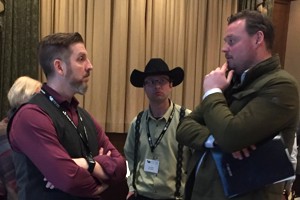
Stephane Beaudoin (left) speaks with audience members after his presentation at the 2019 Banff Pork Seminar.
Stephane Beaudoin with GestBeau and Canadian Livestock Transport (CLT) spoke at the 2019 Banff Pork Seminar about the critical importance of animal welfare during transit.
"The CLT training is for everyone from primary producers, management to loading crews and order buyers. I believe animal welfare is as important as food safety," he says. CLT recently launched online training modules that cover five courses for cattle, sheep, poultry and hogs.
African Swine Fever spreading around the world
Date posted: January 11, 2019
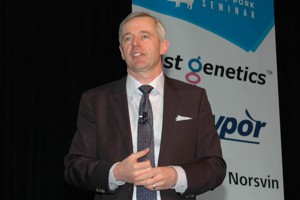
Dr. Egan Brockhoff
African Swine Fever (ASF) may move more slowly than other diseases in the hog industry, but it is more serious than anything Canada has dealt with in the past. At the 2019 Banff Pork Seminar, Jan. 8 to 10 in Banff, Alta., Dr. Egan Brockhoff, veterinarian and pork industry analyst and advisor, shared insights from his travel to countries currently battling the deadly disease such as China and parts of Europe, and his thoughts on ways Canadian pork producers can mitigate the risk.
ASF was unknown outside of Africa, where the native wild pigs are carriers but remain largely unaffected by the disease, until 1957. At that time the disease entered Portugal on a ship through contaminated waste which was fed to pigs. ASF entered the population and circulated slowly throughout Europe from 1957 to 1986.
However, in 2007 a highly infectious strain showed up in Georgia, in Eastern Europe. "From 2007 until 2019, ASF has spread consistently and broadly across Eastern Europe and now into Western Europe. Once again, feeding contaminated waste from international aircraft or ships has been identified as the primary method of moving the virus along. This is a human driven disease not an animal driven disease. Humans are spreading this disease around the world," says Brockhoff.
And the spread continues. In the last four months, Brockhoff advises that nine European countries have reported 1,000 new cases. The primary modes of transmission are through uncooked pork and the transport of frozen pig meat through Europe and the U.K. "While everyone is aware of the situation in China...this virus is moving throughout Europe and in a significant way." The infection of the wild boar population in Europe, which isn't naturally resistant as the African boars seem to be, is another core driver that keeps the virus moving through Europe.
This raises a concern in Canada as North America has a massive wild pig problem. There are three million wild pigs in Texas alone and in Canada we have large wild boar populations in the prairies and further east at least as far as Quebec. European wild boars were brought over to farm and either got out or were released and if these animals contracted ASF, it would be almost impossible to eradicate.
Different transmission
Transmission of ASF is quite different from other diseases. Transmission through direct contact with infected pigs, ticks or stable flies is a slow process, and while still deadly, there is also a high risk of unwitting transmission before ASF is diagnosed. Because this virus is concentrated in the meat, muscle and body fluids, indirect contact is the fastest transmission of the disease. "When a pig dies, in the forest or a slaughter plant, all of that meat is incredibly infectious. This makes it an easy virus for humans to move - in uncooked product for example," says Brockhoff.
Even worse news is that there is no vaccine, no treatment, many of the symptoms are easily mistaken for other swine diseases, the highly virulent strains have 100 per cent mortality and there can be a slow incubation period, which may allow further spread if undetected.
Feed is another high-risk factor in delivering the virus to hog farms. "Dr. Scott Dee has identified organic soybean meal as an amazingly good vector for ASF. The virus survives well in soy products," says Brockhoff. He goes on to add that today Canada is importing organic soybean meal from China for livestock feed. If producers are still using high-risk feeds, they should use quarantine to minimize the chances of spreading ASF. Feed kept at 20 degrees Celsius for 20 days will likely have killed the virus.
Canada has a huge backyard pig population. There are about 6,500 premise IDs for commercial hog operations in Canada. But also in Canada there are about 6,500 small backyard, outdoor hog farms. These farmers may not know or understand the severity of AFS to the hog industry worldwide. And should they get AFS on their farm, it could shut down trade for the entire Canadian hog sector.
2019 BPS student science winners announced
Date posted: January 10, 2019
Two young scientists at the 2019 Banff Pork Seminar (BPS) Jan. 8 to 10, in Banff, Alta. were presented with the R. O. Ball Young Scientist Award.
Named after Dr. Ron Ball, a long-time researcher and former BPS program director, the award recognizes graduate students who provide a best overall combination of good and relevant science, well-written abstract and excellent presentation.
First prize was awarded to Victoria Seip, University of Guelph. Her paper was "Impact of iron status on growth performance and antibody production in weaned pigs."
Second prize went to Mariia Tokareva, University of Saskatchewan for the paper "A comparison of motivation for exercise and stall-housed sows and gilts."
First place winner receives a $500 cheque and plaque and second place receives a $250 cheque.
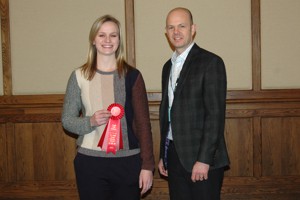
University of Guelph with Ben Willing
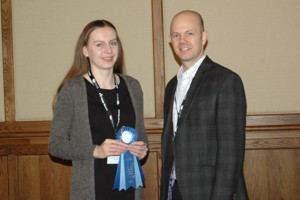
University of Saskatchewan and Ben Willing, University of Alberta.
Tom Stein, Maximus Systems: 2019 Foxcroft Honorary Lectureship
Date posted: January 10, 2019
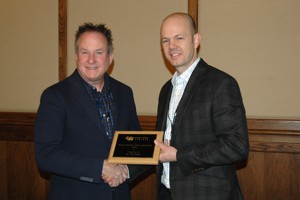
Tom Stein left, Ben Willing, University of Alberta.
Pork producers may have a difference of opinion on many things, but one thing they will agree on is that the impact of technology in their industry will continue to increase.
One place they could get a look at that future was at Breakout Session 6 at the 2019 Banff Pork Seminar (BPS). It brought together three speakers with compelling information on "Big data and technology."
One of those speakers was the George Foxcroft Lectureship for 2019, Tom Stein of Maximus Systems. That award is named after Dr. Foxcroft, the University of Alberta professor, research pioneer and industry icon.
"The George Foxcroft Lectureship in Swine Production has a special meaning," says Dr. Ben Willing of the University of Alberta, who presented Stein with the honor. "It allows the Banff Pork Seminar, in conjunction with the University of Alberta, to host speakers who are conducting high profile research that is applicable to the pork production industry and will potentially improve production efficiency.
"Each Foxcroft Lectureship recipient receives this award based on the quality of their research and the contributions made to the swine industry and there is little doubt of those qualities in the case of Tom Stein," says Willing.
Stein is senior strategic adviser for Maximus Systems, leading the design and development of next-generation pig and poultry production management software using machine learning to automate pattern recognition and analysis. He is the designer of the PigCHAMP software and co-founder of MetaFarms. He was named one of the top 50 men and women who truly have made a difference in the U.S. pork industry. The American Association of Swine Veterinarians recognized Stein for outstanding contributions to swine production and health.
His BPS presentation was entitled "Smart systems in pig production." He was joined in Breakout Session 6 by Bram Visser of Hendrix Genetics who spoke on "Augmented intelligence for better swine breeding" and Ricardo Segundo Cochran, OPP Group who spoke on "Farm center data integration platform."
Follow the fat to improve meat quality
Date posted: January 10, 2019

Brian Sullivan
One of the best opportunities for Canada's pork industry to improve meat quality may be to "follow the fat."
As consumers move away from carbohydrates and fat takes higher profile, focusing on fat may be one of the strategies to improve meat quality. While it is not likely a good idea to get overly focused on one meat component, there is little doubt fat will present opportunities going forward.
That was one of the messages that Brian Sullivan, of the Canadian Centre for Swine Improvement in Ottawa, Ont. had for delegates to the 2019 Banff Pork Seminar, Jan. 8 to 10 in Banff, Alta.
"People often think of meat as protein," says Sullivan. "When we think of alternatives plant protein comes to mind. But meat is so much more than protein and the search for value may mean looking at different meat components than what we have been in the pork industry."
Human nutrition research shows we need protein in our diets and a deficiency of protein or essential amino acids can lead to serious health problems. But too much protein may not be healthy and at the very least is wasteful.
Research is not so clear when it comes to carbohydrates and fat. Research from about 50 or 60 years ago suggested high fat intake was unhealthy and linking fat intake with risk of cardiovascular disease. This led to massive efforts to produce low fat foods. For its part, the pork industry has done a remarkable job of making pork leaner.
In isolation, we might say that's a good thing. Research suggested too much fat was unhealthy, consumers were looking for leaner products and we delivered, as did the dairy industry and others. However, an unintended consequence of lower fat intake has been a shift to increased consumption of carbohydrates. Although this may not have been the intention, it is a mathematical certainty that if we eat less fat, keep protein intake about the same and take in the same amount of food energy, then we must eat more carbohydrates.
Is this a good thing? Recent research suggests it is in fact a very bad thing, a tragic example of what can happen if we look at something in isolation, in this case taking fat out of the diet. A current research question is, therefore, what happens if we put more fat back into our diets so that we don't need to eat so much carbohydrates. We may find that this is a good thing and we may soon find that consumers want products with more fat, including pork products.
Bigger picture
"Meat quality is certainly not simple, and it is much more than a good source of protein," says Sullivan. "Other components of meat, especially fat, have a big impact on nutritional value, consumer satisfaction, processing and economic value.
"Although it is important not to look at anything in isolation, fat may be the most important component of pork that we should be considering for improvement of meat quality. The money is following the fat if you consider our current markets for pork and if you consider which parts of the hog are most valuable today."
If human diets shift to lower carbohydrates and higher fat, demand for good quality fat sources such as pork will increase. As consumers discover that more fat may be healthier, they will also rediscover that more fat is tastier. This will lead to increased demand and more opportunities for pork cuts with optimal amounts of fat and to ways of preparing food with pork fat rather than throwing the fat away.
Technology is available and emerging that can provide much more information about pork carcass and meat quality than previously available, says Sullivan. And recent investments in applied research on new technologies has positioned Canada's pork producers and packers to enhance the quality and value of pork, which is of course, much more than a good source of protein.
"Understanding markets today, especially the higher value markets, could help us to get more value out of the carcasses that are available today," he says. "It can also guide us on what we might change to make carcasses more valuable in the future.
"Although more challenging, it can also help to develop new markets with higher value and demand. If, for example, consumers in North America wanted to shift to lower carbohydrate and higher fat diets, what kind of pork cuts would be most suitable?"
Consumers demand more from meat
Date posted: January 10, 2019

David Hughes
The first day of Banff Pork Seminar 2019 kicked off with an energetic and informative presentation by David Hughes, Emeritus Professor of Food Marketing at Imperial College London, and Visiting Professor at the Royal Agricultural University, U.K. The topic, "Global Food Industry Developments - Implications for the Pork Industry in Canada," took a hard look at food trends from around the world, demand for all kinds of protein in diverse forms and where the opportunities lie.
Most western or developing countries have experienced static or declining per capita meat consumption, with the exception of the United States. But Hughes sees the major battleground in meat protein taking place between chicken and fish, as consumers develop a preference for white meats.
Hughes looks at meat consumption on a continuum. He believes that while the number of vegans or vegetarians grows, the confirmed meat eaters will remain, and possibly look at higher-end cuts of meat. The middle is where it gets interesting with "flexitarians" people looking for good sources of protein who are willing to have a mix of plant and animal proteins.
In the UK, Hughes sees numerous examples of catering to this group in items such as pork or beef sausages and patties being mixed with haricot or red kidney beans. These consumers are making choices for health reasons, perceived benefits for the environment and animal welfare. Flexitarians are often women between the ages of 25 and 35 and have relatively high incomes. "Not only will we see more vegan and vegetarian options, but products like pizzas, lasagnas and pies will replace a proportion of the meat with plants," says Hughes.
Faux meat is also a growing trend, with large food companies investing in this product line. He points to Quorn as a case in point. The UK product mimics chicken and was recently purchased by a large Philippine company to serve the Asian market. "In my mind Quorn will be the first billion dollar global brand of fake meat," says Hughes. Today in UK grocery stores, Quorn has more space in the meat case than any meat protein. "There is a tsunami of veg protein on English shelves and other countries, like Iceland, are following suit."
Additionally, the growing world demand for protein isn't only focused on meat. Hughes terms it "the retreat from meat" and dairy, plant and alternate protein sources such as algae and insects are gaining traction. Animal activists aren't the only ones driving this shift. Mainstream media such as The Economist and McLean's are focusing on alternatives to meat proteins. There is increasing social pressure on consumers to ask about where their food comes from, and how it was made.
Younger, more affluent consumers are driving this shift. Marketing initiatives need to look at new criteria when speaking to the public- the traditional four Ps of Product, Price, Place and Promotion have changed to Purpose, Pride, Partnership, Protection and Personalization. These criteria encompass consumer needs for shared values, a pride of purchase, building a relationship, safe and responsible products, and products that meet their specific needs. "I want to eat food that's good for me and my family and that I feel good about eating," says Hughes of today's consumers.
And they want all of that right now. These needs are consistent around the world. "Striking to me is the extent that global trends are driven and converging through social media...I am seeing young people in China with similar views to their counterparts in the US," says Hughes.
"While kids used to come home and say 'What's for dinner?', young people may be saying 'What is dinner?'," says Hughes. He spoke of a growing trend towards 'snackified' food and ready meals. Meat and fish jerky, small portions, bite-sized protein options, with sushi as a prime example. Easy to eat, whenever, wherever.
These trends and counter trends are driving innovation and hybrids in the protein space. "In North America in the last five years all the growth in food manufacturing is coming from smaller companies (while the big companies have generally seen declines). I have never seen a better opportunity for small scale companies to do well, and what's more, to seek financing from big food companies. They are interested in these products," says Hughes.
There are significant opportunities for the pork sector to adapt and meet the expectations of the modern consumer but Hughes sees this as a critical time. "The meat industry must substantially up its marketing game or it will haemorrhage quickly."
BPS 2019 Aherne Prize winners tell the story behind their inventions
Date posted: January 10, 2019
Each year as the winners of the F. X. Aherne Prize for Innovative Pork Production are announced, there is real interest at the Seminar and across the industry. Again in 2019 the stories behind the winners are quite remarkable, says Dr. Ben Willing, of the University of Alberta, chair of the Aherne Prize committee who presented the awards.
Two winners shared the prize at the Banff Pork Seminar, Jan. 8 to 10, 2019 in Banff, Alta.
Winners for the piglet creep protection device for loose housing were Brett, Jamie and Carl Israel of Carl Israel Farms Ltd. in Mapleton Twp., Ont. Winners for the Tattoo Master, an automatic tattooing solution were Daniel and Justin Maendel of Rosebank Colony in Miami, Man.
Willing says again this year the quality and number of applicants was strong, a sign of the tremendous innovation occurring on farms every day.
"This prize recognizes individuals who have developed either original solutions to pork production challenges or creative uses of known technology," he says. "We are pleased at Banff Pork Seminar to acknowledge these grassroots innovations in the pork industry."
The prize is named after industry icon, the late Dr. Frank Aherne, a professor of swine nutrition and production at the University of Alberta and a major force for science-based progress in the western Canadian pork industry.
Here, in their own words, are winners' descriptions of their innovations.
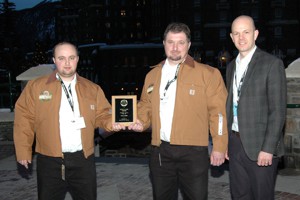
Daniel (left) and Justin Maendel (center) of Rosebank Colony in Miami, Man. With Dr. Ben Willing, University of Alberta.
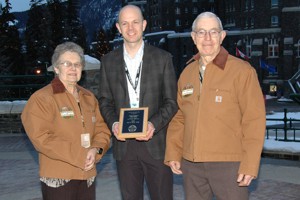
Carl and Carolyn Israel of Carl Israel Farms Ltd. in Mapleton Twp., Ont. With Dr. Ben Willing, center), University of Alberta.
Piglet creep protection device designed for loose housing

As loose housing becomes standard practice across gestation facilities, it is only a matter of time until the market will demand loose housed farrowing sows with litters.
That's the opinion of Brett, Jamie and Carl Israel of Carl Israel Farms Ltd. in Mapleton Twp., Ont., one of two winners who shared the 2019 F.X. Aherne Prize for Innovative Pork Production at the Banff Pork Seminar. Their piglet creep protection invention may help that occur, as they explain in their own words the reason behind their winning entry.
On paper the transition to loose housed farrowing sows makes sense. However, a major issue facing producers transitioning farrowing operations to loose housing pens from traditional confinement crates is the issue of inadvertent crushings.
In some instances, piglet crushing rates can be as high as 50 percent. Piglets born in these settings have a very difficult time finding the safe creep areas, as in most cases the total loose housed farrowing pen is significantly larger than conventional farrowing crates.
Having recently transitioned to organic pork production, our operation faced this very issue.
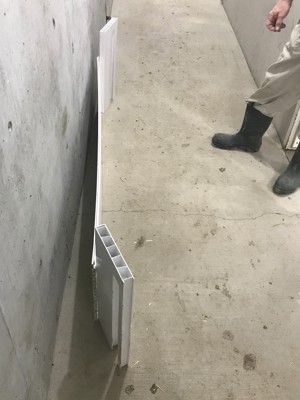
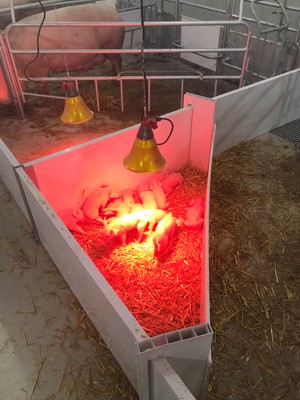
Our farrowing pens are 9 ft. x 9 ft. in size, with the sow being able to freely move around then pen. Upon our first organic sows farrowing we immediately identified that our mortality rates were impacting our bottom line and piglet well-being.
Out of pure desperation we took left over building materials from our recent barn construction, and fastened together a triangular plastic divider that slides over our pen creep dividers. The divider establishes a defined safe creep area under the heat lamp away from the reach of the sow.
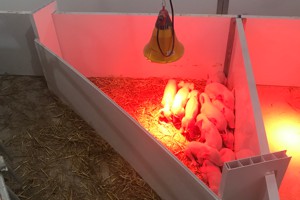
Upon farrowing, we collect all piglets and place them in the protected creep area. We wait until the sow is settled and calls for the pigs, then we release the piglets to nurse. We repeat this process over the litter's first 48 hours, ensuring that every time we enter the farrowing rooms we immediately secure the litter before the sow becomes unsettled.
By utilizing our creep protection device we have developed a process for training piglets to find the creep area, significantly improving our weaning rates. We have effectively increased our weaning rate by one piglet per sow per litter. Additionally, our divider wall provides a handy means of securing piglets for castration saving considerable amounts of time.
Ensuring that producers meet the changing demands of consumers requires on farm innovation. We are proud of our tool, and are confident that it's easy to make recycled nature could be adopted by producers across the industry.
Tattoo Master automates tattooing, streamlines workload
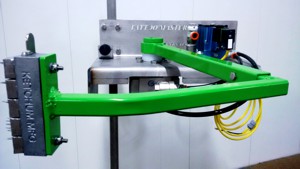
Here's an idea that puts less stress on animals and the people handling them. And it automates tattooing, a job that normally requires hard work for people.
The Tattoo Master designed by Daniel and Justin Maendel of Rosebank Colony in Miami, Man. is a shared winner of the 2019 F.X. Aherne Prize for Innovative Pork Production at the Banff Pork Seminar. Here's an overview of their story in their own words.
Tattoo Master is an automatic tattooing solution designed to ease the burden of everyday hog tattooing while keeping animal welfare and legibility of tattoo as top priorities. It can be mounted on most automatic hog sorters with very little to no modifications, or custom fitted to most others. The simplified solution means the only thing that needs to be done is add ink every 400 hogs. The stainless steel unit can be easily washed with a power washer when required.

Here's how it works.
- Pig enters scale.
- Sorter gates close behind and in front of pig.
- Sorter verifies the correct weight of market hog.
- If the hog is market weight it receives a tattoo from the Tattoo Master unit.
- Front gate opens and market hog gently trots out of the scale to designated holding area.
To all of us in hog production it is a well-known fact that tattooing hogs can be a demanding and time consuming job. We all realize the importance of a legible tattoo at the processing plant because it is the only way for the packing plant to identify our hogs and pay us according to our grades.
Tattoo Master was developed in conjunction with a hog processing plant to ensure a legible tattoo. Another advantage is labor saving and worker safety. Tattoo Master applies the tattoo automatically versus a person swinging a manual tattoo slapper. Swinging a manual tattoo slapper can be a demanding job and sometimes lead to long term shoulder injury or other bodily harm.
Some other improvements were also noted. The Tattoo Master hits every pig with the same amount of force required to make a legible tattoo. Sometimes barn staff doing the job manually will use a little too much force or not enough to make a legible tattoo. There is also less stress on market hogs at loading time because of the stress-free tattoo application from the previous day.
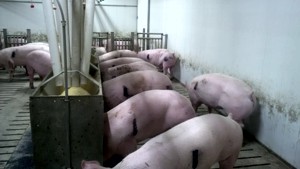
Start thinking for next year
"The Aherne Prize popularity continues to grow and is one that will be continued in future years," says Ben Willing. "Innovation comes from energy and ideas and as delegates head home from BPS 2019, we hope they will be encouraged to enter their innovations in upcoming years."
Smart technologies here or emerging in pork production
Date posted: January 9, 2019

Tom Stein
No argument new smart technologies are coming in swine production says Tom Stein, senior strategic adviser for Maximus Systems. Here are nine examples already here or on the way.
Real-time activity and behavior monitoring to detect problems in pigs or poultry. Changes in pig eating and drinking patterns can be used to detect sickness and provide an early warning system.
Real-time behavior monitoring to detect estrus in sows. Using infrared sensors mounted above a gestation stall to monitor and track sow activity and behavior, estrus and optimal time for insemination.
Real-time audio signal processing to detect respiratory problems in pigs. A microphone hanging over pens of finishing pigs and a machine uses learning algorithm to identify and make sense of pig coughing events. Automated cough detection and monitoring can detect different causes of respiratory problems as well as technical problems with ventilation.
Real-time audio signal processing to prevent crushing deaths in neonatal piglets. The ECHO hardware device listens for piglet sounds and squeals. When it identifies the unique sound of a piglet being crushed, it causes the sow to immediately stand up which prevents a baby pig from being crushed.
Voice-enabled data entry and workflow. A hands-free data entry and workflow management service that helps agriculture professionals capture insights while on the move with the potential to fundamentally shift the way food and agriculture professionals capture usable insights and data.
Real-time image processing to weigh pigs. A 3D imaging prototype for weighing individual pigs.
Tracking movement of on-farm workers using Bluetooth to improve biosecurity. A new system has been tested using small devices, called beacons, a small Bluetooth low energy radio transmitter which are worn by farm staff to track movements and identify wrong, low and high risk actions.
Geofence-based feed traceability using real-time GPS location data. A hardware-software solution for automated and real-time traceability of animal feed.
Smart digital monitoring of medical treatments using RFID, Bluetooth, and Wi-Fi. Wi-Fi and Bluetooth-enabled smart dosing devices that provide automatic medication delivery, data recording, and weight-based and fixed-amount dosing.
The new brain in the barn
Date posted: January 9, 2019

Tom Stein
Get ready for a smart revolution in pork production management systems.
That was the message Tom Stein had for pork producers at the 2019 Banff Pork Seminar, Jan. 8 to 10 in Banff, Alta.
Stein is senior strategic adviser for Maximus Systems, leading the design and development of next-generation pig and poultry production management software using machine learning to automate pattern recognition and analysis.
Stein first outlined what modern, smart control systems are using the Maximus modular computer control system as an example. Then he outlined nine current and emerging smart technologies for pork production.
As pork producers look to the future, they have important decisions to make now about how to get ready for these new technologies, he says. Producers will want to have a single barn control platform system that can connect to or integrate with these new technologies.
"My thesis is that it will be the smart barn control system – 'brain in the barn' – that becomes the single management and control platform for integrating all these new in-the-barn technologies.
"When you look at even this short list of nine emerging technologies, ask yourself questions like: How will they be managed? How many networks will pork producers install in their barns? How many different software applications will pork producers need to work with? Will pork producers want to log-in to 10 or more separate networks and apps to manage each different technology? Will pork producer employees need or want to learn 10 or more separate software systems? Who will service and maintain multiple networks within a pig barn? What about the cost of installing and maintaining 10 separate networks in each site or barn or room?
"One must remember, these nine technologies are the beginning, not the end," he says.
Which management software platform to adopt is another critical success factor for the same reasons. Producers will want a single software platform that seamlessly works with a smart control system because otherwise it will be too hard to manage. Brains in the barn will communicate in real-time and in both directions with brains in the office to spearhead the next evolution in pork production management.
Get more value from consultants
Date posted: January 9, 2019
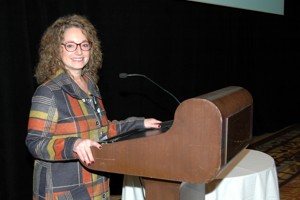
Karen Kerns
Are you consultant ready?
It is a simple question that Karen Kerns says producers should ask themselves. Kerns, CEO of Kerns and Associates was speaking at the 2019 Banff Pork Seminar, Jan. 8 to 10 in Banff, Alta.
"It would be naïve to imagine that any animal production operation could hire comprehensively enough to navigate all political, economic, technological, and economic variables influencing agricultural markets and practices," says Kerns.
Good business given opportunistic times means business beyond boundaries. Integrating consultants into your operation to translate the sea of available information into actionable execution can make the difference between simply performing or exceptionally perfecting.
At the same time, consultants can create as much headache as help. Without the benefit of daily interaction with your team and a long-term experience of your priorities, problems, values, and practices, even the most competent and well-meaning consultant can disrupt operational balance. Common mistakes include introducing change into a system already challenged, imposing an artificial set of solutions or processes based on externally driven assumptions, or focusing on the agendas of individual stakeholders instead of the holistic well-being of the organization.
Four pillars
As business managers interview consultants and assess their value to your operation, they should consider these four pillars underlying a healthy consulting relationship:
Clarity avoids confusion. Conduct an internal assessment that isolates clearly defined problems or opportunities you want to address. Be as specific as possible.
A consultant is only as good as your capacity to use them effectively; if you have not defined operational goals and decision-making processes driving execution strategy, even the best risk management team will fail to protect your operation effectively. The best consultants conduct an operational needs assessment and align needs with targeted outcomes before they charge you a penny.
The cost of "Free". Do not accept consulting because it's free or part of a value-added vendor program. "Free" consulting can cost your organization if it overwhelms your team with conflicting approaches to leadership, technical practices, and product assessment. The "more tools are better" approach confuses rather than empowers.
Beware of a "wolf in sheep's clothing." Some consultants are really marketing their products and services, and, in the process of training, are teaching or driving assumptions that serve their purposes. A primary and perfectly appropriate goal of these types of vendor-sponsored trainings is to build loyalty relationships, but many producers find themselves making decisions based on the "freebies" without completely benchmarking the potential of using a more competitive product or service.
Nothing to lose. While money is received for services, you want to hire consultants who have a higher driving value than "winning the sale." Great consultants avoid pacifying, advocating for, or aligning with specific stakeholders in favor of promoting what is best for the entire operation. These consultants are willing to challenge assumptions, provide alternative perspective, have fierce and clarifying conversations and, if necessary, refuse the consultancy if they feel their client's assessments and goals are inconsistent with what they have assessed will be beneficial for the long term sustainability of the operation and within the realm of what complies with industry practices and standards.
Competitive versus competing. Consultants should have enough confidence in their expertise and execution to avoid the trap of denigrating or undermining competitors, previous work, or existing relationships. Beware the consultant that delivers ultimatums that limit your participation in opportunities that would benefit your operation.
The benchmark of a great consultant is a sense of selflessness when it comes to the client's well-being. That might look like directing a client to a more cost-competitive strategy even it means choosing to incorporate a competing product or stakeholder. You want to maintain relationships with consultants who direct you to and attract beneficial relationships and opportunities.
"Finally, great leaders value their integrity and relationships more than money," says Kerns. "We do not expect consultants to be perfect. In fact some of the best consultants are those who make mistakes and attempt to repair them. But, if you're inviting someone into your business family, choose someone you would welcome as an in-law, not someone whose reputation and practices would be better characterized as an out-law."
Niels-Peder Nielsen: Denmark raises the bar on animal care standards
Date posted: January 9, 2019

Niels-Peder Nielsen
Denmark, long-recognized as a leader in innovation in pork production, is setting a new standard for swine animal care. Their producers hope it will spur new market opportunities as a result.
Niels-Peder Nielsen of SEGES, the Danish Pig Research Centre, told the 2019 Banff Pork Seminar, Jan. 8 to 10 in Banff, Alta. that Denmark takes pride in its worldwide reputation for high efficiency in pig production, and that higher production standards for animal care are coming.
"Besides strong breeding and well-educated pig farmers, this high level of efficiency is attributed to the communication of knowledge from the Pig Research Centre to the pig advisors and on to the pig producers," he says.
To put Danish production into perspective, in 2018 there were 3,300 Danish farmers involved in pig production. Total production includes 1 million sows and 32 million weaners. Average herd size is approximately 770 sows. Per year, 18 million pigs are slaughtered in Denmark and 14 million weaners (30 kg) are exported. National average for productivity in 2017 was 33.3 weaned pigs per year per sow.
Animal welfare and society acceptance
In 2014, the Danish pig sector agreed on an arrangement with government, consumer and animal protection organizations, veterinarians and retail trades to improve animal welfare by 2020.
Danish Agriculture & Food Council Pig Production has been working in all areas and made significant progress, says Nielsen. The most essential areas include the introduction of "The Heart Pig", which is an animal welfare production guide with several levels of animal welfare. Specific details are in the accompanying table.
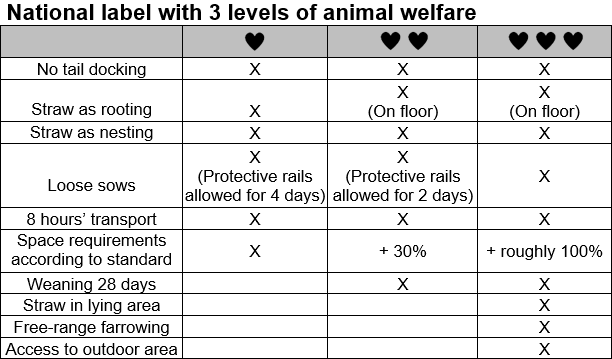
Furthermore, the pig sector has decided to introduce the requirement of local anesthesia when castrating piglets starting January 1, 2019.
Top welfare goals
To move Danish pig production, and especially animal welfare, even further after 2020 four areas are prioritized:
- Farrowing pens to loose nursing sows
- Intact tails
- Termination of castration
- Increased piglet survival
Farrowing pens for loose nursing sows
The goal for this focus area is that at least 10 percent of nursing sows will be in loose housing in 2020.
In looking for more knowledge, SEGES Danish Pig Research Centre in 2018 hosted the international workshop "Loose Lactating Sows 2018" to look at the future of farrowing pens for loose sows. Experts and stakeholders from Australia, the U.S., Canada and Europe participated, representing 12 universities and three essential animal welfare organizations.
Intact tails
Danes are also looking at intact tails throughout the entire life in a full scale system. SEGES Danish Pig Research Centre in 2018 introduced a demonstration project called "All in full scale". Based on existing knowledge, the aim is to demonstrate whether the production of pigs with intact tails can succeed in six to eight production herds producing standard pigs.
During an introduction period, the whole herd is reorganized gradually to eliminate tail docking. In the project process, the herds are supported with counselling with the purpose of reducing the risk of tail biting as much as possible within the existing settings.
Termination of castration
Today, approximately 320,000 entire male pigs are produced in Denmark, and castration is allowed. By Danish legislations, pain relief is required when castrating.
Since January 1 2018, pig producers can voluntarily choose to apply a local anesthetic prior to castration, if the producer has completed a seminar, approved by the Ministry of Environment and Food, in local anesthesia for piglets.
Danish Agriculture & Food Council Pig Production has decided that by January 1 2019 all Danish piglets must be applied with local anesthetic prior to castration.
Long-term plan
In the long term, the aim is to obtain these goals as a part of the production concept for the Danish standard pig, says Nielsen.
Moreover, the future foundation of the Danish pig sector is for the Danish standard quality pig to be sold on high profit markets around the world. The expectation is also that the demands for animal welfare will increase and that will be built into standard pig production. Additionally, it is expected that specialty production will become even more important on the domestic market.
Ellen Goddard: More disruptive technologies coming in pork production
Date posted: January 9, 2019
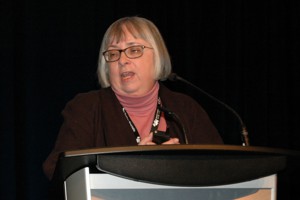
Ellen Goddard
Think Uber. Airbnb. Cellular meat. Insect and plant-based alternatives to meat.
Disruptive technologies. It's a term coined by analysts to describe innovation-driven market disruption in today's fast-paced world and it's one that the pork industry will hear more of ahead and should be working to understand says a researcher on the frontlines of market analysis.
"We hear a lot about disruption and disruptive technologies in agriculture," Ellen Goddard of the University of Alberta told her audience at the 2019 Banff Pork Seminar in Banff, Alta. "Although a lot is said about disruption and disruptive technologies, the meaning behind these terms is not always the same," she says. "We have a tendency to confuse surprising things in our work environment with disruption and although we may feel 'disrupted' it isn't always the result of someone or something disrupting our markets. Sometimes we are disrupting theirs." The term "disruptive technologies", originally coined in 1995, has become a commonplace term. The process of disruptive innovation has been summarized in a recent article as a process whereby a smaller company with fewer resources is able to successfully challenge established incumbent businesses. Specifically, as incumbents focus on improving their products and services for their most demanding and usually most profitable customers, they exceed the needs of some segments and ignore the needs of others.
Entrants that prove disruptive begin by successfully targeting those overlooked segments, gaining a foothold by delivering more-suitable functionality, frequently at a lower price. Incumbents chasing higher profitability in more-demanding segments, tend not to respond vigorously.
Entrants then move upmarket, delivering the performance that incumbents' mainstream customers require, while preserving the advantages that drove their early success. When mainstream customers start adopting the entrants' offerings in volume, disruption has occurred.
A couple of key concepts arise here, says Goddard. Disruptive innovation usually arise due to a focus on 'mainstream' consumers leaving certain segments undersupplied and is usually initiated by a low cost entrant that eventually grows to satisfy all consumers in the market rather than just the underserved initial target. Examples are Uber and AirBNB.
Not all new entrants need to be responded to, and it will not always work to have the established organization purchase the new entrant since sometimes the resulting organization is dysfunctional. It is often through unsatisfied consumers (cost or product attributes) that the disruption occurs.
What does this have to do with farming and pork production? The term disruption is used regularly in the context of a variety of new technologies that are can and are being used in agriculture and food production. Ones identified include 3D printing, robots, drones, sensors, artificial intelligence, augmented reality, virtual reality and block-chain.
While all of these are new technologies and all may change the practice of agriculture, not all are true disruptive technologies, says Goddard. Beyond actual information technology we have the various uses of genetic technologies, including newer gene drives and gene editing. We can also include other developments such as cellular meat, refined plant based meats and insect meat products, all of which can and are impacting traditional livestock markets.
Are all of these classic disruptive innovations or are some normal competition for traditional livestock products? "The reason this is an important question is that the response required from traditional firms or sectors could be entirely different," says Goddard. "Regardless, the role of the consumer in these innovations is critical. Consumers may not only be looking for low cost alternatives, they are also looking for product quality attributes, ethical attributes (animals, environment, labour), health and convenience in their purchasing. And some of the innovations are aimed squarely at these perceived undersupplied attributes requested by today's consumers."
Change. Challenge. Opportunity: Embrace the potential at BPS 2019
Date posted: January 9, 2019
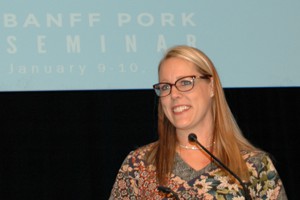
Amy Cronin
New Banff Pork Seminar (BPS) chair, Amy Cronin opened the 2019 Seminar with a challenge to delegates to find the potential in every speaker, every networking opportunity and if they did they would have the opportunity to see the industry in an entirely new light by the time the program was over.
"The Banff Pork Seminar is one that has intrigued me and started the process of thinking about things in a new light on our farm," she says. "This Seminar is one that offers progressive, outside-of-the-box thinking. It is impossible to leave after three days without contemplating things in a slightly, or radically, different way."
Cronin speaks from a grassroots producer and industry perspective, as both a Canadian and a U.S. producer. She operates Cronin Family Farms at Bluevale, Ont. with her husband Mike and their six children. Family, it is clear, anchors that effort and she was proud to tell the crowd that all their children show an interest in pigs and she introduced her eldest daughter who accompanied her on the trip as a learning experience.
"We've been involved in the hog industry for 23 years, owning our farm for 20 years. We've grown each year, through progress and passion, trials and tribulations, to include sows in both Canada and the U.S. We believe in diversity within the industry and are proud of the long-standing relationships that we have with folks throughout the industry. Personally, I am involved on a number of boards within agriculture and our community. I'm passionate about making things better, for my family, my farm and our team, my community and my industry.
"As I reflect upon 2018, there were both opportunities and challenges in our industry. This is certainly no different from the past. We've seen an increase in both North American packing capacity and production, and new and innovative technologies throughout the value chain. At the same time, there are things outside of our control, such as international trade disruptions and negotiations, things like fake meat and the looming global threat of African Swine Fever."
Collaborative efforts
"As always, our industry is coming together in collaborative ways to formulate prevention and action plans, working together locally, provincially, nationally and globally. Take for example the work being done at Swine Health Ontario. We've harnessed some of the best minds in our industry to come up with preventative actions and plans for African Swine Fever. This is just one example of the many innovative and effective actions going on in our industry."
Cronin says agriculture and especially the hog industry, are continuously improving, innovating, adapting and forging a new path, producing some of the most sought-after pork in the entire world. "And take a look outside. Canada - extreme beauty, plentiful fresh water, open spaces, high quality pork from passionate pork producers. This industry may be challenging but it is certainly one we can be proud of," she says.
The plenary and breakout speakers for the next few days are guaranteed to get you thinking she told delegates.
"I'd like to issue a challenge to each of you. Consider our theme for 2019 'Change, Challenge and Opportunity.' Ask yourself three questions for each of the speakers over the next few days:
- What potential change in the hog industry is being presented?
- How does this challenge my business or my sector?
- And most importantly: What is the opportunity coming out of this challenge, and how can I embrace it?
"We can't predict what 2019 has in store, but we can learn as much as we can and take some ideas home to help us prepare. If anything, we are resilient, dedicated, open to change, and above all passionate."
Cronin introduced and thanked the "fantastic people" behind the scenes of the BPS. The Advisory board consists of intriguing people from throughout the country, west and the east, farms, academia, agri-business and more. Each member volunteers to be a part of this prestigious seminar because they feel strongly about the value that comes from the speakers and the sponsors and more importantly, the networking and the discussions.
She also acknowledged the oversight of program coordinators, Dr. Michael Dyck and Dr. Ruurd Zijlstra, and the work of Seminar coordinator, Ashley Steeple.
Good energy in the room as BPS 2019 launches a busy week
Date posted: January 8, 2019

Ashley Steeple
Fresh snow outside, old friends and new experiences awaiting inside. That was the feeling as delegates to the 2019 Banff Pork Seminar worked their way into the beautiful Banff Springs Hotel and through registration lines to get their package of materials for the week.
With some last minute walk-ins delegate numbers will be nicely over 700 and a good number of those were chatting and mingling in the opening reception Tuesday.
It is generally recognized that the official Banff Pork Seminar program launches a week of energetic activity in this world-renowned location. This is the point in the program where the organizing committee that has worked hard to pull this event together can look around feel good about the start.
Seminar coordinator, Ashley Steeple says she and the committee are grateful for the support and pleased to once again work with the Banff Springs Hotel to make this event a memorable one.
"The agreement we signed extending our relationship with this hotel is due in part to the fact that meeting rooms and social areas are arranged in a convenient format," she says. "Networking and personal time are a big part of the reason people attend this seminar. It is very convenient to have so many social options are available right in the hotel making it easy for people to find that personal time.
"The goal is to have everyone leave at the end of the week with an enjoyable experience under their belt and we are confident they will.
"As always, the organizing committee looks forward to feedback throughout the seminar about any aspect of the event," she says. "Filling out seminar evaluations is particularly important."
Walk-in registrations welcome at BPS 2019
Date posted: January 4, 2019
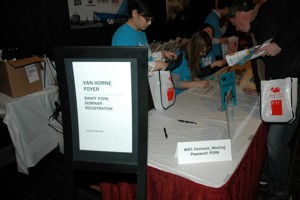
If you are one of the people wishing you had registered for the 2019 Banff Pork Seminar, Jan. 8 to 10, 2019, you still have time. Conference Coordinator Ashley Steeple says walks-in registrations will be accepted in Banff.
"It helps if you can use the online registration link at the website www.banffpork.ca to provide us with all the necessary details, because that speeds up the process when you arrive," she says. "That link will be available until Thursday morning of the Seminar.
"When you show up at the Seminar go directly to the registration desk and we will help get you registered."
The annual last minute tips for BPS delegates
Date posted: January 2, 2019
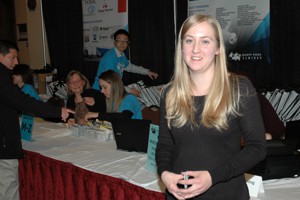
Ashley Steeple
Heading to Banff Pork Seminar (BPS) 2019? Here's a quick last-minute checklist for BPS delegates that that Seminar coordinator Ashley Steeple provides each year.
The venue. The Banff Springs Hotel is where BPS began and the hotel staff and the BPS committee have worked hard to make it special for 2019. There are several restaurants and lounges right in the hotel so check out which best fit your needs. Don't want to wait? Make your reservation ahead of time at www.fairmont.com/banff-springs/dining.
Registration payment. If BPS has not received payment for your registration or your group's registration, delegates will not be able to check in and pick up their kits until payment is received. Please ensure the first person to check in from your group is prepared to settle the invoice. Payment by credit card, cheque or cash is accepted.
Breakout sessions. The breakout sessions delegates have selected are printed on their name tags. If you did not choose sessions, the person who registered your group may have chosen for you. Note that breakout sessions have limited seating and once a session is full, fire regulations prevent BPS from allowing more people in. Please arrive at least five minutes before the session to avoid disrupting speakers and other delegates and to ensure you get to see sessions you want.
Wednesday evening is open. There is no formal event planned for Wednesday evening. Delegates can meet after the day's breakout sessions and enjoy a refreshment from the cash bar in the tradeshow area, then head out on their own to enjoy the best of Banff.
Wear your nametag. Name badges will be required for entry into sessions, functions and meals.
Free wireless. There is free Wi-Fi in the hotel and meeting rooms. Password is "pork".
Check the BPS app. It will have all the program details delegates need for quick, easy access to program details such as breakout locations. App download details will be sent to each delegate.
Banff Airporter Shuttle discount. Anyone arriving by air and wishing to book the Banff Airporter Shuttle can get a discount by booking through the BPS website. Check under the Hotel and Travel button, Airporter Shuttle tab for promo code and details.
Free downtown shuttles. These will be running between downtown and the Banff Springs during the evening. See the program or the conference app for times and pickup locations.
Find the latest news at the Inside BPS 2019 Special Report. Get news, photos and the Inside BPS blog in this Special Meeting Report from the 2019 Banff Pork Seminar, presented by communications partner Meristem. Find the special report link on the BPS website home page or directly on the www.meristem.com home page. Inside BPS Report articles are available with credit for reprint for individual, industry or media use.
Follow BPS on Twitter. Latest news will also be at #Banffpork.
Final program handout. A PDF of the 2019 program handout with final details will be on the BPS website www.banffpork.ca in late December. Click on the Program button at the Home page, then on the printable Program PDF tab.
Seminar evaluations. These are critically important to planning future seminars so please fill them out.
The BPS team looks forward to meeting you in Banff.
Drive the modern pork story from BPS with #banffpork
Date posted: January 2, 2019
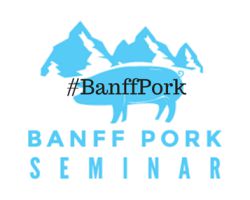
Looking for fresh perspectives on the latest developments in the world of pork? Likely no better place than Banff Pork Seminar (BPS) 2019.
BPS delegates have a chance to share some of the most powerful information on modern pork production and the related food industry chain. One way is to follow the Seminar @BanffPork on Twitter. The second is to tweet frequently and enthusiastically during and around the time of the 2019 Seminar using the hashtag #banffpork.
Over three days of program and almost a full week of related industry activity 2019 BPS delegates will have a window on the absolute leading edge of progress in their industry.
There are food industry developments, advances in animal and environmental care and a host of scientific presentations. Linkages to the national and international pork community are something of real interest as well, with BPS featuring speakers and delegates from across North America and around the world.
As well there is always fresh information from the marketing and communications perspectives, spokespeople who can help the pork industry connect effectively with consumers and society in general.
All of that should make social media easy and valuable to those inside the industry and those looking in the industry's window.

Download the BPS 2019 App
Date posted: January 2, 2019
Here's something that will improve your experience at Banff Pork Seminar 2019. Best of all it's free and easy.
Use the Banff Pork Seminar App to optimize your conference experience and make the most of BPS 2019.
You can view the agenda, find your sessions, read speaker biographies and abstracts and even find your way using the integrated floor-maps. You can also chat with fellow delegates, network with exhibitors and sponsors, stay up-to-date with conference announcements and so much more.
Search the App store for the "Crowd Compass AttendeeHub App" Download then search events for Banff Pork. You can reach the app store on mobile devices at this link https://crowd.cc/s/2eZmQ or from a desktop by this link https://crowd.cc/bps2019.
Enjoy the seminar.
Trade, African Swine Fever highlight Thursday morning at 2019 Banff Pork Seminar
Date posted: December 17, 2018
Few issues have dominated the economic landscape more than trade in recent months and the Banff Pork Seminar is an ideal place to get inside the story on what to expect for 2019 from someone who lives on the front lines of the issue.
The Thursday morning plenary session sees Joe Kerns of Kerns & Associates talk "Tariffs, Trade, and Trepidation – The Implications on the Pork Sector Now & Into the Future."
Then veterinarian and industry leader, Egan Brockhoff of Prairie Swine Health Services tackles one of the most pressing issues in swine animal disease control these days, African Swine Fever. His talk addresses the questions every producer will be thinking on this disease: "African Swine Fever - Can it be Stopped? What Actions are Needed? What Can You Do to Protect Your Investment?"
Brockhoff spends his days immersed in major animal care issues as a practitioner, lecturer and industry advisor and as a result is not afraid to tackle the tough questions. The result will be the most current update available on this challenge.
Full registration for 2019 Banff Pork Seminar, Jan. 8 to 10, 2019 is available until Dec. 20, 2018. Details at www.banffpork.ca.

Joe Kerns

Egan Brockhoff
Still time to register for Banff Pork Seminar 2019
Date posted: December 16, 2018

If you have been wondering about attending the 2019 Banff Pork Seminar, Jan. 8 to 10, 2019 in Banff Alta. you still have time.
Think about this. Five plenary speakers on the most pressing issues and opportunities of the day. Eight breakout sessions with around 20 speakers on practical information you can take home and use. Great food, terrific networking, all in Banff, one of the most beautiful spots in Canada.
"Spaces are filling up and a reminder that last year's Seminar did sell out," says Ashley Steeple, Banff Pork Seminar (BPS) coordinator. "Regular registration deadline is December 20, 2018. After that date a late registration fee applies and there is no guarantee that all conference materials will be available.
"Conference registration fee is waived for full-time undergraduate or graduate students attending a Canadian post-secondary institution. However students must register by Dec. 20, 2018 or full conference fees apply.
"Media who wish to register should contact the BPS office at (780) 492-3651 or by email at ."
Full details and registration forms are available at the Banff Pork Seminar 2019 website www.banffpork.ca. Check out the Inside BPS blog and seminar special report available by linking from the BPS website. It has additional reports on speakers and events during this coming seminar. And follow along on Twitter at @BanffPork, #banffpork.
Alberta Pork returns as Sustaining Sponsor for BPS 2019
Date posted: December 16, 2018
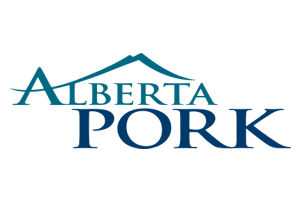
Alberta Pork is excited to once again sponsor the Banff Pork Seminar.
It's been a particularly challenging year for producers. Hog prices are low, trade barriers complicate global relations and new disease threats are worrying.
With that in mind, we are ready to tackle these challenges alongside our partners to make this great industry even stronger, and we are proud to stand with those who are helping to bring innovative thinking to the pork sector.
Thanks to their hard work and dedication, our producers have the highest-quality product in the world.
We hope you enjoy the 2019 Banff Pork Seminar!
PIC welcomes friends and partners to BPS 2019!
Date posted: December 14, 2018

PIC is looking forward to the 2019 Banff Pork Seminar, which is one of the best opportunities in Canada to engage with you, our friends and partners.
At PIC, we continue to focus on developing the best genetics and services to support your business and we welcome the opportunity to visit with you about the challenges and opportunities in the Canadian pork industry.
We are excited about the future and look forward to seeing you in Banff.
PIC is a Sustaining Sponsor of BPS 2019
Amy Cronin: New chair has a global vision for BPS
Date posted: December 11, 2018
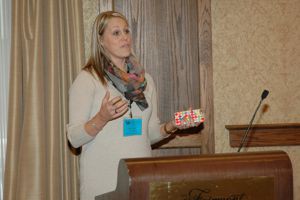
Amy Cronin new BPS Chair
The Banff Pork Seminar (BPS) has a new chair for 2019. And in many ways producer Amy Cronin is a natural representative for a modern, continually evolving Seminar.
BPS draws delegates from across North America and globally. Cronin and her husband Mike are producers in Ontario and in the U.S. and deeply interested in global developments.
BPS has always had a strong leadership focus in speaker presentations. Cronin is a young female entrepreneur and industry leader at a time when more women are moving into industry leadership.
BPS has championed industry diversification. Cronin and her husband are 100 percent in the hog industry but heavily focused on diversification. Each operates their own companies choosing their own business philosophies, to follow their dreams, together and separately.
They provide different things to different customers, some commodity markets, some niche markets, all with a real focus on having long-term win-win relationships. "For example in Canada we sell weaner pigs to the same customer we have for 20 years. That's really important to us," says Cronin.
A vision for BPS
That optimism about opportunities in the pork industry carries over to Cronin's BPS leadership.
"BPS is a conference that gathers the attention of industry across the globe," she says. "It offers the entire industry from producers to service providers to processors the opportunity to come together to learn what's new. It also gives people the platform to do some really great networking, not just within their community, province or even country, but globally.
"The pork industry has a lot of different business models. Whether you are an independent or a vertically integrated producer there are equal opportunities at BPS.
"We need to continually focus on making this seminar global. Attracting people from around the world allows a smaller industry to broaden its network. We're also an industry very much influenced by global occurrences.
"When you have the opportunity to bring in really high level speakers who speak on everything from on-farm solutions to visionary what-if scenarios, it gives everyone a chance to learn from each other and to go home and think about improvements on their farm. It also looks at what the next 20 to 50 years in the hog industry will look like and how you might include some different ideas into your strategic plan in order to be successful in that time.
"I just hope that people from throughout the industry, big or small, independent or vertically integrated continue to be part of and see value in BPS. Last year we had record numbers. That tells me people support the initiative and see value in it. I want to continue to see that. It's fantastic to put the pork industry in the limelight.
"The goal is always to have people leave feeling more informed, more empowered and more prepared to make good decisions on their farm when they get home."
Young scientists and innovators highlight BPS Breakout Session 8
Date posted: December 11, 2018
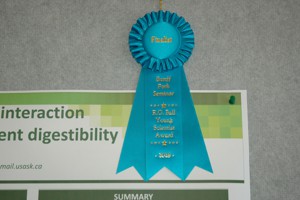
Each year, young scientists gather at the Banff Pork Seminar to tell the story of their research efforts. For delegates it's a look into the future of their industry, for potential employers it's a chance to look at some of the most promising talent emerging in the market.
Breakout Session 8, which takes place on Wednesday afternoon only, is where the winning student research posters selected are chosen to give presentations on their work. Outside the session doors will be posters of all other young scientist entries, all of it interesting in its own right.
"What has been nice this past year with the R.O. Ball Young Scientist Award was we had students from the U.S. and from Eastern Canada," says Michael Dyck, 2019 BPS program co-chair. "So it wasn't just the usual suspects from Saskatchewan, Alberta and Manitoba, but competing with students from Ontario as well as Iowa State University. We hope it will continue this year."
The other part of Breakout Session 8 is the F. X. Aherne Award winner's presentation. "This award is always a very popular draw for delegates to attend this session because it represents on-farm innovation that can be adopted in other operations," says Ruurd Zijlstra, co-chair with Dyck for BPS 2019.
"This session allows people to get a full view of the prize winning innovation and to ask questions directly to the presenter. The F. X. Aherne Prize and the R. O. Ball Young Scientist Award will be awarded officially on Thursday morning prior to the morning plenary session."
Full details are available at www.banffpork.ca.
"Beyond the horizon" plenary wraps up BPS 2019
Date posted: December 3, 2018
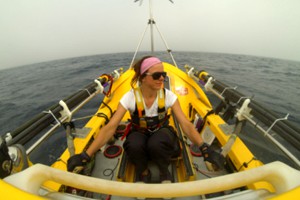
Mylène Paquette
Most players in the pork industry will remember a time in their lives where they felt like they were staring off into the horizon not sure what was coming up.
Banff Pork Seminar (BPS) 2019 wraps up with a powerful speaker who has done that and has a remarkable personal story of endurance and personal growth.
Mylène Paquette, from Quebec, became the first person from the Americas to successfully undertake a solo crossing of the North Atlantic Ocean in a rowboat, a human adventure that goes beyond a simple feat of athleticism.
Paquette decided to change her life completely following a deeply moving conversation with a gravely ill child. She took up ocean rowing to explore her passion for the seas and fulfill her desire to become a mariner. Today she tells her story to audiences across Canada.
"We are continuing our theme of the past few years of closing off the Seminar with a different type of speaker, one that is a little less topic-heavy and more something that appeals broadly to all delegates," says Michael Dyck, program co-chair for 2019 BPS.
"It's a chance for delegates to close out the 2019 Seminar program with some refreshments, personal networking and an enjoyable presentation. We also thought it was appropriate to have a speaker who spent a lot of time staring off into the horizon and not really knowing what was coming up. That's kind of what the pig industry is like."
Media welcome at Banff Pork Seminar 2019
Date posted: December 3, 2018

Media interviews
Top speakers on major issues and the latest opportunities in the pork industry. That's one reason why each year the Banff Pork Seminar (BPS) attracts a contingent of media from across Canada and interest around the world.
"Media attendance at an event such as BPS also says a lot about the pork industry's confidence, pride and openness," says BPS chair, Amy Cronin. "An underlying message to each year's seminar theme is how the industry is building trust with consumers and the general public.
"The fact that media are encouraged to attend and report the results of these presentations, that we encourage them to track down speakers for additional details, adds to the value of the information for all audiences," she says.
"This media activity is shared across North America and around the world. That sharing of knowledge and perspective is one of the legacies of BPS and one of the reasons it continues to be a leading event known globally."
Media are asked to contact the BPS office to register to attend BPS 2019. More details are on the BPS website www.banffpork.ca.
Part of the BPS communications effort is a Special Report including the Inside BPS blog, feature articles and photos. These articles are available for media support and industry use. The link to the report is available at the Seminar website www.banffpork.ca.
Delegates can also help tell the story of pork by following BPS on social media. They can follow the Seminar @BanffPork on Twitter. And they can tweet frequently and enthusiastically during and around the time of the 2019 Seminar using the hashtag #banffpork.
The secrets to sow longevity
Date posted: December 3, 2018
It's a topic that never fails to draw big interest in Banff Pork Seminar (BPS) Breakout Sessions.
"Sow longevity or lifetime productivity is a topic we have addressed in past seminars but always draws interest," says Michael Dyck, program co-chair for BPS 2019. "One reason is there is always new research and recent developments.
"There has been a fair bit of research money going into this in Canada and U.S., a lot stimulated by National Pork Board. We have three strong speakers with new thinking in the area."
"We have a local speaker, Jenny Patterson from the University of Alberta, who has worked with systems across Canada and the U.S. looking at gilt management," says Dyck. "Gilt management is the start of the breeding herd so if you don't do gilt management appropriately you aren't going to have lifetime productivity and longevity in the sow herd."
Related to that Derald Holtkamp from Iowa State University has been looking at the economic gains from keeping your sows in the herd for a certain amount of time. There is a point of diminishing return with keeping sows in the herd and Holtkamp looks at "The economics of sow longevity" in the herd.
Finally Jerry Torrison from the Veterinary College at the University of Minnesota looks at causes and consequences of sow mortality.
"Torrison brings an interesting perspective because he looks at what you can learn from sows that are doing poorly within your system," says Dyck. "He's been quoted as saying that to a pathologist a sow that dies is a bit of a gift, an opportunity to learn, because a pathologist can open her up and let her tell you things."
Sow longevity topics are featured in BPS Breakout Session 6.

Derald Holtkamp

Jerry Torrison

Jennifer Patterson
Two routes to better feed efficiency
Date posted: November 27, 2018
There is no doubt of the value of improved feed efficiency, the question is how best to achieve it.
Breakout Session 3 at Banff Pork Seminar (BPS) 2019 looks at two speakers talking two routes to improved feed efficiency and carcass quality: Genetics and nutrition.
"On one hand we know there are things we can do on the genetic side to enhance feed efficiency and carcass quality," says Ruurd Zijlstra, BPS 2019 program co-chair. "We understand we have genetic changes over time. That may be about a 1% improvement, so it takes a longer time to make progress. Whereas on nutrition side you can make a very rapid improvement and a very quick change, but it may not be as cost effective as a genetic change.
"We have a local speaker and also a speaker from Kansas State University who are leaders in this research area."
Graham Plastow of the University of Alberta will talk on "Genomic advances to increase feed efficiency and carcass quality of grow finish pigs." And Joel DeRouchey from Kansas State will talk on the nutritional side, "Feeding programs to optimize feed efficiency and carcass quality of grow finish pigs."

Graham Plastow
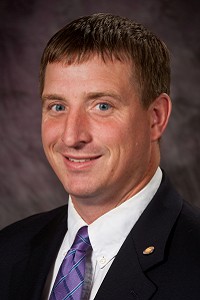
Joel DeRouchey
The search for true meat quality
Date posted: November 27, 2018
Meat quality can be an elusive goal in the pork industry. Breakout Session 1 at the 2019 Banff Pork Seminar (BPS) has two knowledgeable speakers on the subject. And in what is a first for the Seminar, this session features a live meat cutting demonstration to show exactly how goals can be achieved.
"There is always a focus on carcass quality in the pork industry," says Ruurd Zijlstra, program chair for BPS 2019. "The challenge is you can have the same carcass quality with quite a range of actual meat quality when it comes to meat tenderness and cooking quality.
"So we thought we would get two of the hotshots in this growing and important area of research. Michael Young of Canadian Pork International will talk on 'Canadian pork quality with confidence'. He will do actual cutouts to show different ways that cuts can be done for different markets or for different product goals.
"Brian Sullivan of the Canadian Centre for Swine Improvement Inc. looks at things from the rapidly evolving genetic perspective. 'Pork, more than just a good source of protein' is the title of his presentation."

Michael Young

Brian Sullivan
Harvesting the promise of big data and new technology
Date posted: November 20, 2018
Some of the most popular sessions at Banff Pork Seminar (BPS) over recent years has been presentations on new technology.
Breakout Session 7 in 2019 looks at harvesting the promise of big data and new technology options and thinking to accomplish that.
"We collect a lot of data but it is becoming quite a science to take data and turn it into information that you can use in production systems," says Ruurd Zijlstra, program co-chair for BPS 2019. "We have been saying for a long time that if you don't measure it you can't manage it. We are at the point where we are measuring so much that it is becoming a real challenge to manage it.
"This is a big theme in agriculture on both the livestock and crop production sides. Any way of dealing with information that takes you to where you are potentially automating some of the decision making has powerful potential."
Three speakers tackle this subject area. Tom Stein of Maximum Systems has been involved with many systems over the years and has seen the evolution of the data collection as well as systems to capture its value. He will speak on "Smart systems in pig production."
Then Bram Visser of Hendrix Genetics looks at the use on the swine genetic side with his presentation "Automated intelligence for better swine breeding."
The third speaker, Ricardo Segundo Cochran, from the OPP Group in Uruguay, looks at the "Farm center data integration system" on a large farm in that country.
Registration details for Breakout Session 7 are on the BPS website www.banffpork.ca.

Tom Stein

Bram Visser

Ricardo Segundo Cochran
Hear the latest on animal welfare in transport at BPS 2019
Date posted: November 20, 2018
Few topics have been more on the mind of livestock producers than animal welfare. It has been touched on over the past several years at Banff Pork Seminar (BPS) and it continues to be top of mind for a lot of producers and the industry.
"In past we have dealt with issues such as sow housing, pain mitigation, different castration techniques, and those discussions have been well received," says Michael Dyck, BPS program co-chair for 2019. "This year we are looking at transport and in particular some of the considerations with regards to code, some of the expectations on transport."
Breakout Session 2 features two speakers who are immersed in this area and are familiar with the latest developments.
"Stephane Beaudoin of GestBEAU Inc. works out of Quebec and consults extensively with the pork industry on animal welfare," says Dyck. "He will be talking about the Canadian transport system and specifically an update on the Canadian Livestock Transport Program.
"We also have Niels-Peder Nielsen, an international expert from Denmark to round things out and get an international perspective. Europe faces a bit more pressure in these areas and as a result tends to be a bit more progressive and maybe ahead of the curve relative to North America. Learning where they are going may be a hint of where we are headed in the future in our markets."

Stephane Beaudoin

Niels-Peder Nielsen
Finding the road to the robust pig
Date posted: November 14, 2018
There may not be anything more critical in pork production than finding the road to producing robust pigs. Breakout Session 5 at Banff Pork Seminar (BPS) 2019 tackles that subject with three capable speakers coming from varying perspectives.
"It is not only important that you count numbers, pigs per sow per year, but also that you have a certain robustness in those piglets that they actually reach weaning weight," says Ruurd Zijlstra, program co-chair for BPS 2019 . "So we thought having a session on what is happening with pigs in early life would be of interest."
Batch farrowing is one option to have more pigs within a group as opposed to a weekly farrowing schedule. Blaine Tully of Swine Health Professionals talks on "Batch farrowing - tools to bullet proof the sow farm."
Sylven Blouin of Jyga Technologies looks at the economics of batch farrowing conversions. Their company is focused on housing of all aspects, from nursery through into group housing.
"Nutrition has a key role as well," says Zijlstra. "Marcio Goncalves of Jefo Nutrition talks on nutrition that affects pig robustness as well as pig survivability."
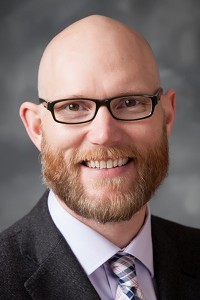
Blaine Tully

Sylven Blouin

Marcio Goncalves
Harnessing the power of people
Date posted: November 14, 2018
One recurring issue in boardrooms and coffee shops around the pig industry is how to attract, motivate and keep quality people.
Breakout Session 4 at Banff Pork Seminar (BPS) 2019 has some innovators in this important area.
"One program theme we get really good feedback on is dealing with human resources, maintaining peoplepower in the system," says Michael Dyck, 2019 program co-chair.
"This year Karen Kerns of Kerns and Associates looks at 'Business development and management,' how you can better incorporate your human resources efforts into your business policy to make that an aspect of how you run your business.
"And Andrea De Groot of Ontario Pork Industry Council talks on high and low skill worker programs in Canada and how best to engage them, employ them and keep them in your system.
"We expect the people topic will be an important one again at this year's seminar," says Dyck.

Karen Kerns

Andrea De Groot
BPS 2019 registrations and hotel rooms moving briskly
Date posted: November 8, 2018

A quick check in with Banff Pork Seminar 2019 coordinator Ashley Steeple finds that registrations are on pace with last year's sellout level. And hotel rooms are moving briskly.
"Early bird deadline for registration is Nov. 15, 2018 and hotel room deadline is Dec. 1, 2018," says Steeple. "At last report there were still a number of rooms available but they are going quickly."
The program is looking good. "We had several exciting applications for the FX Aherne award and a solid batch of research abstract entries for the poster session."
Steeple says work has started on the 2019 conference app and delegates should watch or details in the coming weeks.
Don't miss day 1 BPS: The future of protein, disruptive technologies
Date posted: November 8, 2018

Ellen Goddard
Not long ago when people planned their meals the choices for protein would be meats like pork, chicken, beef or fish.
All that's changed, says Michael Dyck, program co-chair for Banff Pork Seminar (BPS) 2019. "Now we're having Mexican or Italian or something similar. Now we're thinking new plant proteins, or even futuristically, like manufactured meat in a petri dish."
"The whole attitude behind protein is changing," says Dyck, "and that's why we have brought in one of the best people in the field to speak. Professor David Hughes who speaks on "Global Food Industry Developments – Implications for the Pork Industry in Canada" in plenary session 1, the first day of BPS has become a sought after researcher and speaker.
Based in Britain, he has extensive experience in Canada and internationally. Well versed and knowledgeable, he is also not afraid to challenge conventional wisdom.
Then Ellen Goddard of the University of Alberta tackles "Disruptive technologies, public perceptions and implications for pork."
"Disruptive technologies are ones that will change the industry," says Dyck. "For example, Code of practice could introduce a disruptive technology that people have to start using. Or if gene editing becomes an accepted practice it could really change the way we select animals. It could be disruptive in that it could be good for some aspects of the industry but bad for others.
"If meat in a petri dish becomes something the consumer is interested in, it may drive the industry in one direction. But that may not be the most viable way to produce protein.
"Goddard looks at a lot of consumer perspectives, where consumers get their information, what are the perspectives they have and how do those filter back through the grocer and the processor to the producer," says Dyck. "She looks at everyone involved in the supply chain. How one aspect of consumer perspectives can cause adjustments at every level of the supply chain."
"These are two speakers who could change the way you look at the industry and the opportunity," says Dyck.
Free pre-BPS presentation on two critical topics
Date posted: October 29, 2018
Here's another reason to attend the 2019 Banff Pork Seminar.
Delegates can sign up for a free pre-conference presentation on two pressing topics in the swine industry today, African Swine Fever (ASF) and antibiotic use.
Hosted by Swine Innovation Porc, the meeting takes place at the Fairmont Banff Springs hotel on Tuesday, Jan. 8 from 2:00 p.m. to 5:00 p.m.
In the first session Egan Brockhoff of Prairie Swine Health talks on "ASF: Three things you need to know." And Greg Douglas, Maple Leaf Foods looks at what Canada can do to mitigate ASF risks.
The second half of the afternoon Christian Klopfenstein, Centre de développement du porc du Québec leads off with a talk on "Antibiotic use in Canada: How are we doing?" And under the topic of how other commodities are dealing with antibiotics, Karen Kirkwood of Alberta Chicken Producers tells the chicken industry's story.
The event is free but registration is required. Simply send an email to . Program details are available here.
The people who directed Banff Pork Seminar 2019
Date posted: October 29, 2018

Service is a powerful part of any industry and on any day in the pork industry many individuals step forward to help build and manage the fundamentals that make the industry stronger. The people listed below stepped forward and volunteered to be on the organizing committee for Banff Pork Seminar (BPS) 2019.
It is a strong and diversified group made up of capable players from all aspects of the industry, government and academia. The committee also draws from people across Canada and is set up with a process of continual renewal, ensuring fresh thinking each year.
Here are the people on the 2019 BPS Advisory Committee.
- Chair: Amy Cronin, Cronin Farms, Bluevale, Ont.
- Program co-chairs: Michael Dyck and Ruurd Zijlstra, University of Alberta, Edmonton, Alta.
- Conference coordinator: Ashley Steeple, University of Alberta, Edmonton, Alta.
- Javier Bahamon, Alberta Pork, Edmonton, Alta.
- Stéphane Beaudoin, GestBEAu Inc., St-Germain-de-Grantham, Que.
- Dawn Friesen, Fast Genetics, Spiritwood, Sask.
- Daniel Godbout, PIC Health Assurance, St-Augustin, Que.
- Darcy Pauls, Cargill, Niverville, Man.
- Bryan Possberg, Polar Pork Farms, Loreburn, Sask.
- Bill Rempel, Steve's Livestock Transport, Red Deer, Alta.
- Leigh Rosengren, Rosengren Epidemiology Consulting, Midale, Sask.
- Greg Simpson, Hypor, Burgessville, Ont.
- Casey Smit, Olymel, Humboldt, Sask.
- Ben Willing, University of Alberta, Edmonton, Alta.
- Jason Wood, Alberta Agriculture and Forestry, Edmonton, Alta.
The advisory committee is an open process. Anyone interested in serving on the committee or learning more about its role is invited to contact a current member.
2019 Banff Pork Seminar sponsor support keeps delegate costs down
Date posted: October 24, 2018
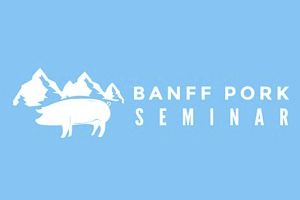
Solid sponsor support for the 2019 Banff Pork Seminar (BPS) again has direct benefits for all delegates.
"Each year we want to remind ourselves just how sponsor support dramatically lowers the cost for each delegate attending this seminar," says BPS program co-chair Ruurd Zijlstra. "We could not afford to have a conference of this scale without this financial support of sponsors. Our figures show it would cost almost double what we charge."
There's another benefit says BPS co-chair, says Michael Dyck. "Those sponsors bring teams of delegates to the whole seminar environment. That brings a real boost of energy to the networking opportunity for all delegates.
"Here are the 2019 sponsors listed in order of sponsorship category starting with the largest," says Dyck. "On behalf of all delegates to BPS, we thank them all for their support."
Sustaining Sponsors
- Alberta Pork
- Fast Genetics
- Hypor
- Maximus Systems
- PIC
- Swine Innovation Porc
- Topigs Norsvin Canada
Premier Plus Sponsors
- AFNS, University of Alberta
- DuPont
- Maple Leaf Foods
- Merck Animal Health
- New Standard West Equipment
- Olymel
Premier
- Agribution Canada Ltd.
- Canadian Pork Council
- Elanco Animal Health
- Masterfeeds
Select Sponsors
- Ajinomoto Animal Nutrition
- Alberta Animal Nutrition Lecture
- APC, Inc.
- Automated Production
- Barkman Concrete Ltd.
- Big Dutchman Inc.
- Biovet Inc. and Jupiter Agrobiotech
- Boehringer Ingelheim Animal Health
- Canada Pork International
- Canadian Hog Journal
- Canola Council of Canada
- Cargill Animal Nutrition
- Champion Alstoe Animal Health
- ChemoMetec A/S
- Diamond V
- DNA Genetics
- DSM Nutritional Products
- Dutrion North America
- EastGen
- Gestal by Jyga Technologies
- h@ms Marketing Services
- Hipra Animal Health
- Hylife Ltd.
- Jarvis Canada
- Jefo Nutrition
- Karyotekk Inc.
- Kemin Canada
- KWS Cereals, USA, LLC
- Manitoba Pork
- Ontario Pork
- Penner Farm Services
- Pharmgate Animal Health
- Phibro Animal Health Corporations
- Prairie Hog Country
- Schippers Canada Ltd.
- Sec Repro/Bock Industries
- Sunterra Farms Ltd.
- Walbern Agri-Systems.(1991) Ltd.
- Zoetis
Supporting Sponsors
- Alberta Barley
- Alltech
- AQINAC/Le Porc Show
- Canadian Bio-Systems Inc.
- Canadian Centre for Swine Improvement
- Cooperative Program in Agricultural Marketing and Business, University of Alberta
- Chr. Hansen, Inc.
- Farm Credit Canada
- Gallant Custom Laboratories Inc.
- GestBEAu Inc.
- Steve's Livestock Transport
- University of Minnesota
- Warman Veterinary Services
News Release: Banff Pork Seminar 2019 tackles "Change, Challenge, Opportunity"
Date posted: October 12, 2018
Canada's major pork industry event is off and running as the first registrations roll in for the 2019 Banff Pork Seminar (BPS). It runs Jan. 8 to 10, 2019 at the Banff Springs Hotel in Banff, Alta.
The theme "Change, Challenge, Opportunity" is fitting given that the industry is coming off a volatile year in pork markets, says BPS program co-chair Dr. Michael Dyck of the University of Alberta. "The North American pork industry is a resilient group. When they face challenge they look to the future, think change and opportunity.
"We're confident the 2019 program will deliver fresh thinking for delegates," he says. "The Banff Seminar has built its brand with the best speakers on key topics of the day."
"We strive for a blend of big picture and practical," adds his 2019 program co-chair, Dr. Ruurd Zijlstra. "Plenary sessions deliver the latest on the big issues and breakout sessions focus on thinking and ideas that can often be taken home and implemented."
Tuesday evening's welcome reception begins the always enjoyable social side of the big seminar in the beautiful, world renowned mountain town. Wednesday's morning plenary session tackles "The future of protein," with international market researcher Professor David Hughes. He is followed by Dr. Ellen Goddard of the University of Alberta who will speak on "Disruptive technologies, meat quality and consumer perceptions."
Thursday's morning plenary sees Joe Kerns of Kerns and Associates tackle "Tariffs, trade and trepidation: The implication on the pork sector now and into the future."
A broad selection of breakout sessions over two days deal with topics that most directly affect production. Topics include meat quality, animal welfare and transport, feed efficiency, human resources, managing the robust pig, sow longevity, and big data and technology. Wednesday also features a special innovators' breakout session.
Full program details and registration information is available at the Seminar website www.banffpork.ca. Follow on Twitter @banffpork. Connect on Facebook /BanffPork.
Student science abstract deadlines Oct. 31, 2018
Date posted: October 12, 2018
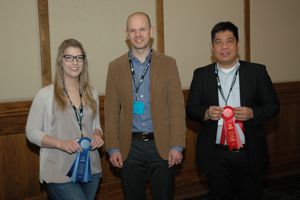
2018 winners Danilo Sotto, University of Saskatchewan, (right) and Jill Hugman, University of Alberta with presenter Dr. Ben Willing of U of A, center.
Each year, the R. O. Ball Young Scientist Award presented at the Banff Pork Seminar (BPS) seems to attract broad interest among young scientists.
Named after Dr. Ron Ball, a long-time researcher and former BPS program director, the award recognizes graduate and undergraduate students who provide a best overall combination of good and relevant science, a well-written abstract and an excellent presentation.
Deadline for abstracts for the 2019 Banff Pork Seminar student competition is October 31, 2018.
2019 Banff Pork Seminar Aherne Prize entry deadline is Oct. 31, 2018
Date posted: October 12, 2018
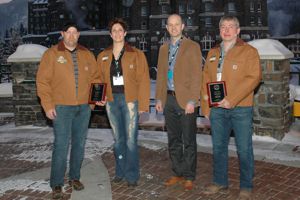
Two winners shared the F. X. Aherne Prize at the 2018 Banff Pork Conference. Left to right Lyle and Maaike Campbell, Birnam Pork, Arkona, Ont., Dr. Ben Willing, University of Alberta and Scott Hyshka, Mountain Vista / Sunterra Farms, Drumheller, Alta.
One of the highlights of the annual Banff Pork Seminar (BPS) is the announcement of the F.X. Aherne Prize for Innovative Pork Production. Entry deadline for the upcoming 2019 BPS Aherne Prize is Oct. 31, 2018.
Dr. Ben Willing of the University of Alberta, chair of the selection committee, says each year the number and quality of entries for the Aherne Prize is a clear example of the thirst for innovation among the many players involved with pork production today.
The Prize recognizes individuals who have developed either original solutions to pork production challenges or creative uses for known technology. Innovations big or small, complex or simple can be entered. In fact both types have been winners in the past.
Willing says the contest is open to owners, production managers, herdspeople or consultants in the North American pork industry, or anyone who has developed an innovation relevant to the North American pork production industry.
"Contest details are on the Seminar website www.banffpork.ca," says Willing. "All segments of the pork industry qualify. That includes areas such as feeding, breeding, ventilation, disease control and prevention, transportation, manure management, animal handling, facility or enterprise management, and pork quality and safety."
Besides the recognition of having innovations featured at this world-renowned pork industry conference the prize is a valuable one, says Willing. It includes free 2019 BPS conference registration, accommodation at the spectacular Fairmont Banff Springs Hotel and travel for the Banff Pork Seminar Jan. 8 to 10, 2019 for up to two innovators. The value of that registration and travel is approximately $2,000 each.
The award is named after a proficient industry innovator, the late Dr. Frank Aherne, a professor of swine nutrition and production at the University of Alberta in Edmonton and a major force for science-based progress in the western Canadian pork industry.
Welcome to Banff Pork Seminar 2019
Date posted: October 12, 2018

Communications is a key in today's business world. The annual Inside BPS Special Meeting Report 2019 you are reading is done for the benefit of the industry. Produced by Meristem editors in partnership with the Banff Pork Seminar (BPS) organizing committee, it is designed to take you "inside" BPS to help you keep on top of those developments.
If the past is any indication, it is a good bet delegates will travel from across North America and around the world to attend. They will be searching for knowledge from speakers at the leading edge of a rapidly evolving modern, global pork industry. Those delegates create an unparalleled networking opportunity for all. There will also be some fun to be had in this world renowned resort community and celebrated hotel.
The information in this Special Report – including blog items and news features – is designed to be available for use by media and industry, with credit to the source. These are a few key points.
The BPS hub. The best place to get everything you need to know about the 2019 Seminar, Jan. 8 to 10 is the Seminar website www.banffpork.ca. You can sign up for e-news advisories from Seminar coordinator, Ashley Steeple.
Inside BPS blog. These blog items will provide key information and perspective prior to, during and immediately following the 2019 seminar. Blog items are designed for use by media, industry communications specialists, producers and others in the industry. Simply provide a credit line to the Inside BPS Special Report and a live link to the Meristem website www.meristem.com.
News releases and news features. While these articles are primarily designed for media and industry communications specialists, they are available for anyone to use and are available for reprint. News releases can be used without requirement to provide credit. News features should be credited to the Banff Pork Seminar 2019 and linked to www.meristem.com.
Photos. Selected speaker photos are available for use. Credit Banff Pork Seminar.
Media assistance. As in past years, media assistance is available. You can find contact information and other key details under the "Media Assistance" link in the top right column of this Special Report web page.
Social media. Information and links to stories on BPS will also be featured on social media. Watch for regular updates under the #BanffPork hashtag. Follow the Banff Pork Seminar at Twitter handle @BanffPork and on the BPS Facebook Page. Follow Meristem at Twitter handle @NewStreamTweets.
As always, Banff Pork Seminar organizers hope your time in Banff is a truly outstanding one. Welcome to Banff Pork Seminar 2019.


